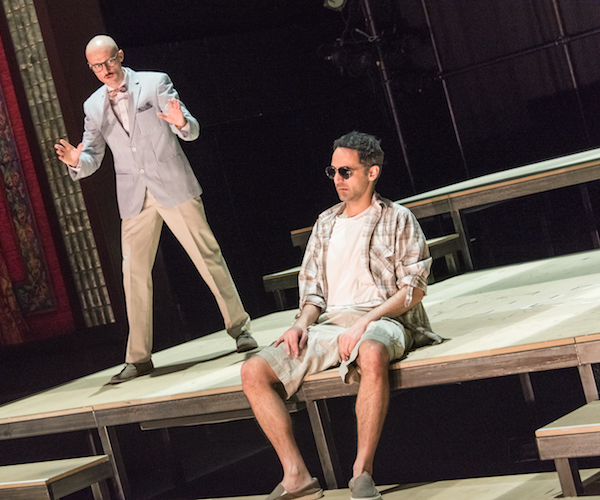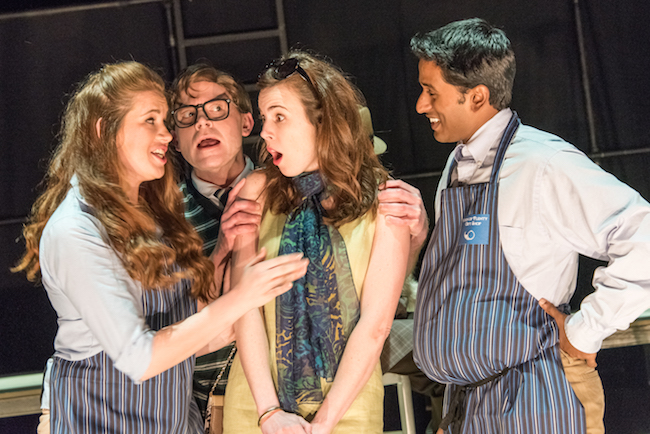Theater Review: “Rhinoceros” on Newbury Street
With one of our major political parties descending into pugnacious demagoguery, and the global resurgence of religious extremism and aggressive nationalism, Rhinoceros is as timely as ever.
Rhinoceros by Eugène Ionesco. Translated from French by Derek Prouse. Adapted and directed by Wesley Savick. Presented by Suffolk University and Boston Playwright’s Theatre at Suffolk University’s Modern Theatre, 525 Washington Street, Boston, MA., through March 13.

L to R: Alex Pollock and Nael Nacer in the BPT and Suffolk University production of “Rhinoceros.” Photo: Stratton McCrady.
By Ian Thal
Eugène Ionesco’s Rhinoceros is one of the most iconic plays among those that critic Martin Esslin dubbed “the theater of the absurd.” Written in 1959, the drama premiered the following year in Paris (Jean-Louis Barrault both directed and played the script’s protagonist, Berenger) and London (Orson Welles directed Laurence Oliver). The allegorical narrative is set in a provincial city whose residents, over a period of several days, find themselves transforming into rhinoceroses: they stampede through the streets, trample cats, and smash park benches and buildings. It is unclear whether people are succumbing to a mysterious illness hypothetically named “rhinoceritis” or whether they are willingly abandoning the demands of human civilization in order to bask in the pleasures of brute force and the herd mentality. In the end, only Berenger (Nael Nacer in this production), the dissolute everyman protagonist in a number of Ionesco’s scripts, still clings to his humanity.
Ionesco was in part inspired by his own experience in 1938 Romania when many of his friends and associates, seemingly over night, became fervent supporters of the fascist Iron Guard. But the play is also undoubtedly a response to faddish French intellectuals, such as Jean-Paul Sartre, who were apologists for the crimes of communist regimes. Israeli novelist Amos Oz coined the Hebrew verb lehitkarnef (literally “to rhinocerize”) to describe those who conform their opinions to fit in with the majority. (In a recent interview Oz mentions his pleasant surprise that the word has filtered into the speech of Israeli taxi drivers.)
Director and adaptor Wesley Savick has had a long relationship with the play, this being the third production he has presented since the late 1980s, each time poking at the political anxieties of the time: the saber-rattling of the Reagan era, the period between the September 11 attacks and the 2003 War in Iraq, and now the Republican campaign of Donald Trump and the Tea Party.
Savick’s 2016 adaptation generally hews to the 1960 translation by Derek Prouse, but when it departs to make references to contemporary Boston the result is problematic. During the talk-back, Robert Scanlan, artistic director of The Poets’ Theatre, said he was supportive of the adaptation, but noted that there had been some “misgivings from the Ionesco Estate.” And this discomfort is not without justification. On the positive side: Berenger and Jean’s use of today’s vernacular helps make the dialogue sound fresh. On the inconsequential side, some of the French names have been replaced: M. Papillon becomes Mrs. Butterfly (Dana Nacer), Botard becomes Lumpen (Robert Kropf), and Dudard becomes Stinger (Brian Bernhard). On the debit side: some of the changes come across as self-indulgent efforts to sound hip, or flatter audience members into feeling that they are hip. References to Facebook and Tinder (Savick doesn’t seem to realize that Tinder is a dating or hook-up application) don’t add much; neither does dropping in names of local institutions, such as Boston University, MIT, and the MFA. The allusions risk turning Rhinoceros‘ first act into a high-brow version of Sheer Madness: golly gee, Ionesco could have set the play in Boston!
The director’s acts of self-sabotage are unfortunate. Savick is correct in his belief that Ionesco’s play doesn’t deserve to be dismissed as a cultural artifact of post-WWII, Cold War-era Europe. But he misses some powerful opportunities to make his point. For example, a single newsy reference to religious extremists near the end of the production does not make up for the fact that Savick ignores an ironic reality: the boutique shops and cafés of his Newbury Street setting are located only one block over from Boylston Street where, only three years ago, a terror attack and its aftermath, inspired by fanaticism, killed five and wounded 280. Thankfully, Savick keeps his self-indulgent bows to ‘relevance” to the first act; the second and third acts are well paced and Lumpen’s speech in particular is laced with delightful word play.
The cast members demonstrate considerable clowning chops, but the production hinges on Nael Nacer’s wonderful performance as Berenger, Ionesco’s underachieving, self-loathing everyman. (It takes lots of technique to appear to be constantly hungover.) Still, the most virtuoso turn here is provided by Alex Pollock as Berenger’s best friend, the persnickety Jean. Pollock’s performance maintains a precise comic intensity, whether in his highly stylized portrayal of an uptight intellectual and closet fascist in the first act or, in act two, when Jean has contracted a full blown case of rhinoceritis. Pollock continually contorts his body, making his gait increasingly ludicrous. Part of the fun is wondering just what Pollock will come up with when he comes up with his character’s final transformation. Robert Kropf also delivers deliciously over the top oratory as both as the logician and as Berenger’s co-worker, the paranoid yet conscientious Lumpen. If there is a weak performance — and to be fair, it may have been a directorial choice — it is Raya Malcolm as Daisy, Berenger’s love interest. Here she comes off as an ingenue to be won and lost by the hero, not a young woman who is fighting to realize her own desire – after all, the script has her pursuing Berenger and then leaving him out of her fascination for the awesome power of the dominant species.

L to R: Laurie Riihimaki, Matt Finn, Molly Kimmerling, Jake Athyal in the BPT and Suffolk University production of “Rhinoceros.” Photo: Stratton McCrady.
Ionesco’s plays demand stylized performances, and Savick is a very capable director of physical and visual theater – the clowning at Mrs. Butterfly’s law offices is excellently handled, but the standout farce episode is when Berenger visits Jean at his flat – Jean’s bed is vertical but the chair he sits in is continually being rotated ninety degrees. The elderly concierge and his wife (Matt Finn and Laurie Riihimaki) appear from below the risers on scenic designer Sara Brown’s three-tiered stage. The surreal changes in perspective make for a hilarious counterpoint to the body-horror of rhinoceritis. Was Jean’s building designed by a cubist architect? Just what do rhinoceroses think of modern art?
Sound designer David Remedios is in top form, filling the space with sustained blasts and rumbling percussion. The off-stage rhinoceroses’ powerful bellows and interludes of stomping are vivid and alarming: we sense both the fear and the awe they arouse. Leslie Held dresses the cast in cartoonish costumes that slowly become sillier and more exaggerated as the production continues – Mrs. Boeuf’s (Molly Kimmerling) beehive wig and the Francophile couple living below Jean are particularly amusing.
The post-show talk back, primarily a discussion between Savick and Robert Brustein, former artistic director of the American Repertory Theater and currently scholar-in-residence at Suffolk University, explored the relevance of Rhinoceros. Brustein pointed to how Ionesco portrays the difficulty extremism poses to well-meaning liberals who are fearful of being considered bigots (cultural imperialists) if they condemn our foreign enemies too harshly. There are some on the left who bend over backwards as they wonder how to accommodate ISIS, Hamas, or Hezbollah.
So far so good. But when Brustein asserted “I don’t understand what [Ionesco] has against reason and logic” he made a misstep. Ionesco isn’t interested in critiquing rationalism or irrationalism — he is noting their complex coexistence. They shape each other. The logician figure is not mocking logic, but the exercise of a ‘reasonable” sophistry that ignores what words mean in order to disregard the demands of complexity and ambiguity. Brustein misses what Ionesco knew well: reason alone can’t generate justice, compassion, or love. The beheadings, crucifixions, sex trafficking crimes, and slave trade transactions that take place within the Islamic State are regulated by a body of religious scholars issuing ‘correct” theological decrees. The authoritarianism of the Soviet bloc was defended by teams of philosophers, economists, and political scientists, all opportunistic adherents to Marxist theory. Tyrannies exploit thought, bending it (into grotesque shapes) to suit their ends.
With one major political party descending into pugnacious rhetoric and demagoguery at home, and the resurgence of religious extremism and aggressive nationalism in so many corners of the world, Rhinoceros is as timely as ever. Let’s hope the next time Savick takes up this play he trusts Ionesco, his text, and audiences more: there’s no need to be cute when driving home its still salient point about the absurdity of conformity.
Ian Thal is a playwright, performer, and theater educator specializing in mime, commedia dell’arte, and puppetry, and has been known to act on Boston area stages from time to time, sometimes with Teatro delle Maschere. He has performed his one-man show, Arlecchino Am Ravenous, in numerous venues in Massachusetts and Rhode Island. One of his as-of-yet unproduced full-length plays was picketed by a Hamas supporter during a staged reading. He is looking for a home for his latest play, The Conversos of Venice, which is a thematic deconstruction of Shakespeare’s The Merchant of Venice. Formerly the community editor at The Jewish Advocate, he blogs irregularly at the unimaginatively entitled The Journals of Ian Thal, and writes the “Nothing But Trouble” column for The Clyde Fitch Report.
Tagged: Alex Pollock, Boston Playwrights Theatre, Eugène Ionesco, Nael Nacer, Rhinoceros, Suffolk University
